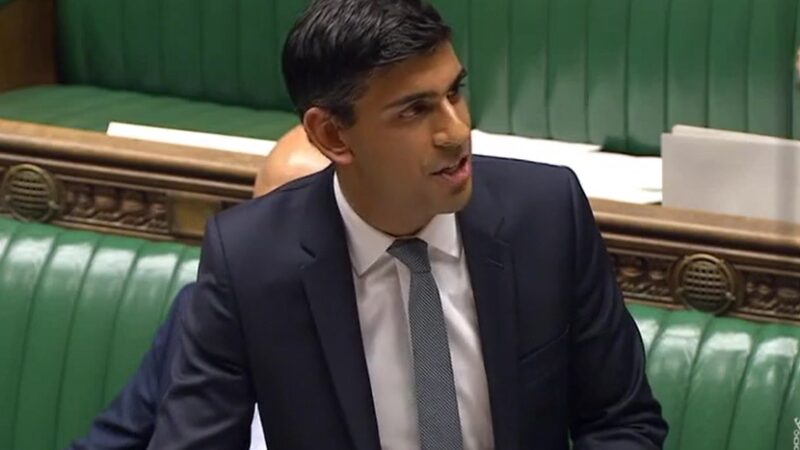'Compare the inhuman treatment of pensioners and other vulnerable groups with welfare programme operated for the benefit of finance industry and speculators.'

Prem Sikka is an Emeritus Professor of Accounting at the University of Essex and the University of Sheffield, a Labour member of the House of Lords, and Contributing Editor at Left Foot Forward.
This week a vote in the House of Commons scuppered the House of Lords’ attempt to maintain a link between the state pension and average earnings. The government’s one year suspension of the triple-lock has permanent effects. It deprives pensioners of £5.4bn in 2022-23 and a total of £30.5bn over the next five years. There will be no catch-up. The government could have used the £37bn surplus in the National Insurance Fund account to honour its election pledge of keeping the triple-lock but chose not to do so.
The government has also removed £4bn of Universal Credit from some of the poorest people. Altogether, large amounts of money have been removed from household budgets and local economies. Millions will suffer. Thousands of impoverished pensioners will die from cold as they make hard choices between eating and heating.
Now compare the inhuman treatment of pensioners and other vulnerable groups with welfare programme operated for the benefit of finance industry and speculators.
The 2007-08 financial crash resulted in a £1,162bn bailout of banks by the state which at its height consisted of £1,029bn of guarantees and a cash outlay of £133bn. This was followed by the never-ending austerity, wage freezes, tax rises and cuts in public services. Normal people got punished even though they did not cause the crash.
Since 2009, the Bank of England has handed another £895bn to banks and speculators through its quantitative easing (QE) programme i.e. it effectively printed money. The money has been used to buy government and corporate bonds and flood the markets with cash or liquidity. The Bank of England propped up the bond prices of tax dodging companies such as Apple and Thames Water. It bought bonds of companies with minimal presence in the UK. Examples include US telecom companies Verizon and AT&T. The state’s interventions have increased the price of financial assets and profits for speculators.
Much of the QE has been used to shore-up bank balance sheets. A large part has also escaped into shadow banks such as private equity and hedge funds, an unregulated sector which is as retail banking, if not bigger, and is posing new dangers. There are no capital adequacy requirements or stress tests upon their balance sheets to withstand shocks.
QE facilitated low interest rates which have decimated the real value of household savings. Ultra low interest rates and vast monetary expansion has encouraged speculation on an epic scale creating bubbles in the housing, securities, commodities and other markets. This has benefitted the rich, widened inequalities and is incubating another crisis. The Bank of England warns that “the prices of some financial assets appear high relative to historical norms” i.e. there is a danger of a crash.
Bank loans to businesses have been fairly static. Small and medium sized enterprises say that the lack of finance is holding back their investment plans. Banks have not used the QE money to support SMEs.
QE and low interest rates have also caused a debt explosion as households, corporations and financial institutions have taken on more debt. Rather than investing in real assets, corporations are investing in QE-driven financial assets as that promises higher returns. At some point the asset bubble will pop. The Bank of England now says that the rising levels of corporate debt is a growing threat to the UK economy.
The era of QE, low interest rates, low corporate tax rates and low inflation have not been used to boost investment in productive assets. The UK invests around 16.9% of its GDP in productive assets, compared to an average of 20.1% by the EU countries. As a result, the UK is unable to address its low productivity problem.
There is little tangible benefit of QE to ordinary households. Real wages have barely exceeded the pre-crash levels. Even as stock markets gained from QE, the benefits did not trickle-down. Only 13.5% of UK listed company shares are held by UK-resident individuals and 54.9% are held by foreign residents. So gains to UK households are minimal and confined to the wealthy.
Of course, the government had the choice of directly investing £895bn in the economy. Imagine what could have been done if £895bn of QE was used for a Green New Deal, building social infrastructure, rejuvenating manufacturing, starting new industries, securing energy self-reliance, clearing slums, writing off the debts of students and poor households. If the people’s QE caused inflation, this could have been managed by removing money from the rich through progressive taxation policies.
The inescapable conclusion is that governments are engaged in class wars. They have prioritised the interests of banks, speculators and financial markets over the welfare of people. A state unwilling to improve the lives of millions of people finds billions for the finance industry and speculators. Spending by pensioners and others would have stimulated the local economy and saved town centres from becoming economic deserts. In contrast, QE has not brought any durable tangible benefit to households and economic renaissance remains elusive. Governments need to be forced to rethink economic management and develop people-centred policies.
To reach hundreds of thousands of new readers we need to grow our donor base substantially.
That's why in 2024, we are seeking to generate 150 additional regular donors to support Left Foot Forward's work.
We still need another 117 people to donate to hit the target. You can help. Donate today.



